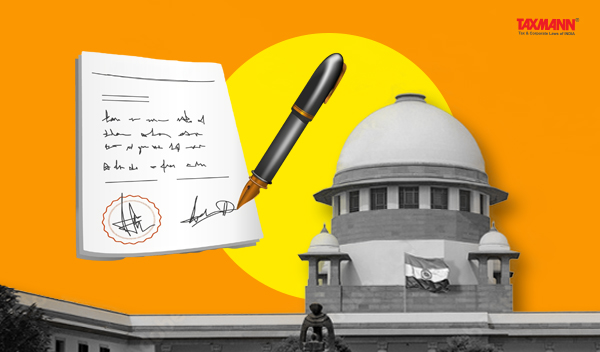Signing of Instrument of Conveyance Doesn’t Raise Any Presumption of Income to Be Assessed in Hands of Other Co-Owner | HC
- Blog|News|Income Tax|
- 2 Min Read
- By Taxmann
- |
- Last Updated on 20 February, 2025

Case Details: Smt. Shivani Madan vs. Principal Commissioner of Income-tax - [2025] 171 taxmann.com 347 (Delhi)
Judiciary and Counsel Details
- Yashwant Varma & Harish Vaidyanathan Shankar, JJ.
-
Ms Hasneeta Matta, Prateek Kumar & Ms Ankita, Advs. for the Appellant.
-
Sunil Kumar Agarwal, SSC, Shivansh B. Pandya, Viplav Acharya, Ms Priya Sarkar & Utkarsh Tiwari, Advs. for the Respondent.
Facts of the Case
The assessee and her husband had joint ownership of a property. Assessing Officer (AO) held that the property would be liable to be viewed as being jointly owned in equal share by the assessee and her spouse and thus taxed in accordance with section 23(1)(a). Accordingly, he computed the annual letting value and 50 per cent thereof being assessed in the hands of the assessee.
On appeal, the Commissioner (Appeals) affirmed the order of the Assessing Officer. Later, the Tribunal also affirmed the view holding that since co-ownership of assessee and her husband was evidenced in sale deed but there was no specification of their respective shares in deed, it must be held that husband and wife purchased equal shares.
The matter reached before the Delhi High Court.
High Court Held
The Delhi High Court held that section 26 speaks of apportionment and ascertainment of the extent of income that can arise in an assessee’s hands in cases where the respective shares are defined or are ascertainable. Section 27 also defines as to what meaning is to be ascribed to the expression ”owner of house property.
As is manifest and evident from a reading of provisions, the Income-tax Act fails to raise any presumption in law of income necessarily arising or being liable to be assessed in the hands of an individual merely because it be a signatory to an instrument of conveyance.
The question of taxability would necessarily have to be answered bearing in mind the individual who had in fact obtained benefits from the property. In the absence of any finding in tune with the above having been rendered insofar as the assessee is concerned, the order of the Tribunal cannot be sustained. Accordingly, the instant appeal was allowed, and the order of the Tribunal was set aside.
List of Cases Reviewed
- Smt. Shivani Madan v. ACIT [2023] 147 taxmann.com 423 (Delhi – Trib.)/[2023] 200 ITD 198 (Delhi – Trib.) [para 11] reversed.
- Commissioner of Income Tax, Bombay v. Podar Cement Pvt. Ltd. and Others (1997) 5 SCC 482 [para 8] followed.
List of Cases Referred to
- CIT v. Podar Cement Pvt. Ltd. and Others (1997) 5 SCC 482 (para 7).
Disclaimer: The content/information published on the website is only for general information of the user and shall not be construed as legal advice. While the Taxmann has exercised reasonable efforts to ensure the veracity of information/content published, Taxmann shall be under no liability in any manner whatsoever for incorrect information, if any.

Taxmann Publications has a dedicated in-house Research & Editorial Team. This team consists of a team of Chartered Accountants, Company Secretaries, and Lawyers. This team works under the guidance and supervision of editor-in-chief Mr Rakesh Bhargava.
The Research and Editorial Team is responsible for developing reliable and accurate content for the readers. The team follows the six-sigma approach to achieve the benchmark of zero error in its publications and research platforms. The team ensures that the following publication guidelines are thoroughly followed while developing the content:
- The statutory material is obtained only from the authorized and reliable sources
- All the latest developments in the judicial and legislative fields are covered
- Prepare the analytical write-ups on current, controversial, and important issues to help the readers to understand the concept and its implications
- Every content published by Taxmann is complete, accurate and lucid
- All evidence-based statements are supported with proper reference to Section, Circular No., Notification No. or citations
- The golden rules of grammar, style and consistency are thoroughly followed
- Font and size that’s easy to read and remain consistent across all imprint and digital publications are applied



 CA | CS | CMA
CA | CS | CMA
